
Gibson guitar photo gig

For Beijing Residents, Home Is Where the Family Is
 Published 2 Feb 2008 for CNN.com. Click here for link.
Published 2 Feb 2008 for CNN.com. Click here for link. BEIJING, China (CNN) -- Peter Wu is brimming with pride. "Have I told you that I'm a father now?" asks the 35-year-old Beijing resident. "My wife just gave birth to a baby girl!"
The baby is a timely addition to Peter's family, not least because they are faced with the pending demolition of their home, which is located along the narrow alleyways of one of Beijing's ancient hutongs. Peter says the compensation he was set to receive from property developers for his 20-square-meter house would have been about $1,170 per square meter.
But a new member in the family changes the equation.
"Now that my baby's arrived, they'd have to compensate me enough to buy a three-bedroom apartment," says Peter, who went by a false name for this interview.
Peter is among thousands of families in the path of China's rapid redevelopment. Under the country's compensation system for claiming their property, officials consider not only the size of the house, but also the size of the household, according to an expert.
"There are many factors governing the compensation payment offered to private owners in the case of an expropriation," explains Wang Yi, Professor of Law at Renmin University of China. "But in both cases, the number of people living in the household is indeed an important factor when considering compensation payment."
As China grows and prepares for the 2008 Olympics, older neighborhoods are making way for new sports facilities, luxury shopping complexes and residential areas. Between 40,000 to 50,000 households a year have been relocated during the past few years as part of the Chinese capital's redevelopment program, according to Sui Zhenjiang, director of Beijing's construction committee. However, a report by the Geneva-based Centre on Housing Rights and Evictions puts that number at 1.5 million.
Real estate prices have skyrocketed. The cost of new homes increased 42 percent -- from $821 per square meter to $1,169 -- between 2004 and 2006, according to a report published by Web site Sina.com and New Real Estate Magazine. As the capital's real estate prices climb, more residents are refusing to move due to what they see as low levels of compensation being offered to them. There have been protests in cities-- and rural areas -- across the country with accusations of illegal land grabs and unfair compensation.
"I'm not moving," says the owner of a small convenience store inside the narrow alleys of Dacaochang Hutong, right behind Wangfujing Grand Hotel. "With the amount of money they are offering, you can perhaps get something outside the fifth ring road. [But] there is no way I can buy my own place anywhere within the city."
Rewards for resettlement
Peter now waits to see if the arrival of his baby girl will boost his chance of higher compensation. "It is commonly known that even with the same property size, a household with five members is definitely entitled to a larger compensation than a household with just two members," Peter says.
"With five people in the family, the compensation would have to be enough to buy a two- or three-bedroom property. A family with just two people only needs a one-bedroom apartment. You can't pay the same amount of compensation to all families."
For others, it is more than a matter of compensation. There is also the question of history. In Beijing's narrow alleys -- or hutongs -- where Peter's home is located, residents look upon their neighborhoods with pride, an aesthetic dating as far back as the 13th century. They say the hutongs helped shape the capital's character and now ask: "at what price new development?"
With skyscrapers rising around them, residents of these old Beijing quarters still go about their daily routines as demolition looms: old men chat over a game of chess in the middle of the alley; second-hand traders haggle over the price of old electrical goods; and pet owners take their dogs out for a walk.
The only thing that is visibly out of place in this pleasant neighborhood is the eviction posters plastered on gray brick walls at every turn. The meaning behind the posters is loud and clear: "7 Days." That's the countdown to the deadline for early relocation rewards. Those who choose to move out before the deadline will be entitled to a $7,314 reward. The award matters little to Peter; he says he would not accept the money.
"The amount is too low. It would have to be at least $6,648 per square meter. Or else, we're not budging. We're sitting on prime land!"Ningxia Part 1: Dirt Poor, Technology Rich

Trip 1:
Early Oct 2007
The
Ningxia is also the home of


We were here to rediscover the life of Ma Yan—the 18-year-old author of The Diary of Ma Yan—who brought us back into her old village in the remote and mountainous areas of Ningxia. The

The landscape was remarkable. I could see vast expanse of parched land along the way, earth that has cracked under the scorching sun and dry winds. “It may look dry, but the recent rain has made it soft. If you step on it, you are going to get sucked in and there’s no way of getting out. Kids have died because of that,” warned our driver.

It didn’t take us too long to discover that the children here are no strangers to the media. In fact, they seem to be a media-savvy bunch. Especially the kids from the village at the bottom of the mountain. They were following us as we walked up. And everytime I touch my camera, the kids around me would suddenly merge into a formation in front of me. I don’t even have to tell them to pose. All I have to do is take my camera out and there’s a pose right in front of me. Great! “1, 2, 3…say qiezi!” (the Chinese equivalent of ‘cheese!’ or rather ‘tomato!’)
It’s always interesting to have cute little village kids surrounding us but these kids here were a wee bit dirty for me to want to hang out with them. All I could remember was, most of them had snot on their faces and were trying to sniff them up and down. There were green stuff trickling down their noses and some had a translucent, glue-like smear across their cheeks. I’d like to play, kids, but we should get some tissues first.

We reached Zhangjiashu at noon and were served lunch at one of Ma Yan’s relative’s house. Almost everyone in the village has the surname Ma, which meant everyone here is related. The houses were made of mud and every family lives in a tiny room which is used as a kitchen, a living room, a bedroom and dining room. They cook there, they eat there and the entire family sleeps there.

Cave dwellings or yaodong still exist for some poorer families. “I used to live in a cave dwelling when I first got married,” said Ma Yan’s mother, Bai Juhua. “Very few people live in one of those anymore. Recently, a few of them collapsed because of the rain. Thank goodness nobody was hurt.”
The conditions in the village were poor. Due to its altitude high up in the mountains, it is impossible to dig wells that are deep enough to reach the water table below. Villagers have concrete wells that are used to store rainwater only when it rains. So what happens when there’s no rain? “We have to walk into town to get the water from the well there or buy water from the village below,” said Bai Juhua. My eyes went wide. It’s hard to imagine living in a place where water is such a commodity that unless someone takes a 2-hour walk down the mountain to carry a bucket up, there is nothing to drink. And don’t even start asking questions about showers.
Shower might be a luxury in villages in
More pictures on my flickr photo journal
The Story of Ma Yan has been aired on Al Jazeera English channel and can be viewed here
Ningxia Part 2: Village Comfort

Trip 2:
Mid November 2007
Unlike my first trip to Zhangjiashu, the scenery this time round was completely different. No rain. No muddy slopes. No more greenery. Everything was brown. Dirt brown.
When I said there was no greenery in sight, I meant none at all. Not even green vegetables. For a dry village high up in the mountains, it is not possible for villagers to grow their own greens. Therefore, the only vegetables that they use here are root vegetables such as radishes and potatoes.
We visited the


Handmade noodles are basic staples here. Freshly made in the little room that is at once their bedroom, kitchen and living room, we sat on the warm kang bed and watched as food was prepared in front us and served to us right there on the bed. That’s right, if you live here, this tiny room is all you get. Eat, sleep, cook, entertain your guests all in one multi-function room.

That night, after 3 dinners and some in-village entertainment over dancing and karaoke, we finally went to sleep inside one of the houses. Nothing was lacking in this village. My stomach was so full after 3 dinners that I couldn’t immediately sleep. The kang bed was in fact too warm that I had to take the blanket off every 5 minutes. The stove, which was next to the bed, was kept burning to keep the room heated so I could smell the charcoal burning throughout my sleep. And thank god I didn’t have to pee that night.
Now that’s another story. There are no toilets or bathrooms here. Or should I say, everywhere can be a toilet. When I asked one of the ladies to bring me to the toilet that evening, she brought me out to the open field next to the house and said, “Here. I’ll stand behind you to keep watch.” I looked out to the vast open land in front of me and the house behind, frantically trying to see if there’s a ditch or an elevated slope there. I was walking in circles.
“Stop walking any further. Do it here,” she said, wondering what the heck I was looking for. So there I was, in the middle of the open field under freezing conditions, answering nature’s call with the lady behind me.
Planet In Peril
Bai Juhua- - the Mother behind Ma Yan

I’ve never heard of Ma Yan before filming this story. Excerpts of her diary published in the French newspaper, Liberation, got the French public talking. A little village girl in China who had no money to go to school—exotic location, mysterious Chinese village, touching story about a girl’s struggle to go to school—I can see why this was a story. However, as we got to know Ma Yan and her mother Bai Juhua, we discovered that the story was more about a mother’s struggle and sacrifice rather than just a girl who wrote a diary.

Bai Juhua, like many other villagers in the area, had to search for work in the neighbouring
Bai Juhua and her fellow villagers had to climb onto moving trains to get to
“Initially, my reason for sending Ma Yan to school was because I didn’t want her to be like me. I only went to primary 1. I didn’t get to study anymore after that. So I told myself, no matter what happens, I am going to send my daughter to school,” Bai told me. Many girls in the village at that time were considered lucky to be able to go to school. Most would be married by the age of 15 or 16.
When Bai Juhua asked if I was married, I couldn’t help but let out a surprised laugh. I was 26 but I never thought I could be way over the hill compared to the village girls who got married at 16. When chatting with one of the village mothers with 3 kids, I discovered that she was only 25.

Many of the women in the villages did not get a chance to go to school. Right now, Bai Juhua devotes most of her time helping Enfants Du Ningxia, a French NGO set up by the journalist who discovered Ma Yan, providing scholarships and better education opportunities for poor children in rural areas. A portion of the royalties from Ma Yan’s publications goes into a trust for helping these children. Bai Juhua is also currently trying to set up a program to empower the rural women of Ningxia through a cooperative embroidery project.
Far Away from the Maddening Crowd

The villagers in the rural areas of Ningxia are Hui Muslims. As a minority group, couples are not restricted by the one-child policy. These kids here have 6 other siblings, making it 9 children in total for this family in Zhangjiashu.
From what we have seen, the whole family practically sleeps together on one bed in a small little room. How couples manage to procreate under such cozy conditions remains a mystery. It must have been a merry occasion by the time the 9th child was conceived.
Guilin

Guilin really did make me feel almost at home--in Ipoh. I've always heard of my hometown being described as Little Guilin, so visiting the real Guilin felt almost like a validating experience. It is indeed pretty similar to Ipoh, just 3 or 4 times better. Sharp, jagged karsts in the backdrop, streams running through lush greenery, vast expanse of mountainous landscape--Guilin was pretty as a picture.
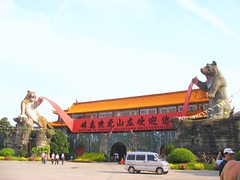 However, my trip to Guilin was a measly one-day trip. And instead of soaking up the natural tranquility of its scenic rivers and mountains, we spent our day at the tacky Bear and Tiger Park (you can tell from the photo at the entrance). Our mission that day was to find some tiger meat and tiger wine, apparently sold at the park's restaurant.
However, my trip to Guilin was a measly one-day trip. And instead of soaking up the natural tranquility of its scenic rivers and mountains, we spent our day at the tacky Bear and Tiger Park (you can tell from the photo at the entrance). Our mission that day was to find some tiger meat and tiger wine, apparently sold at the park's restaurant.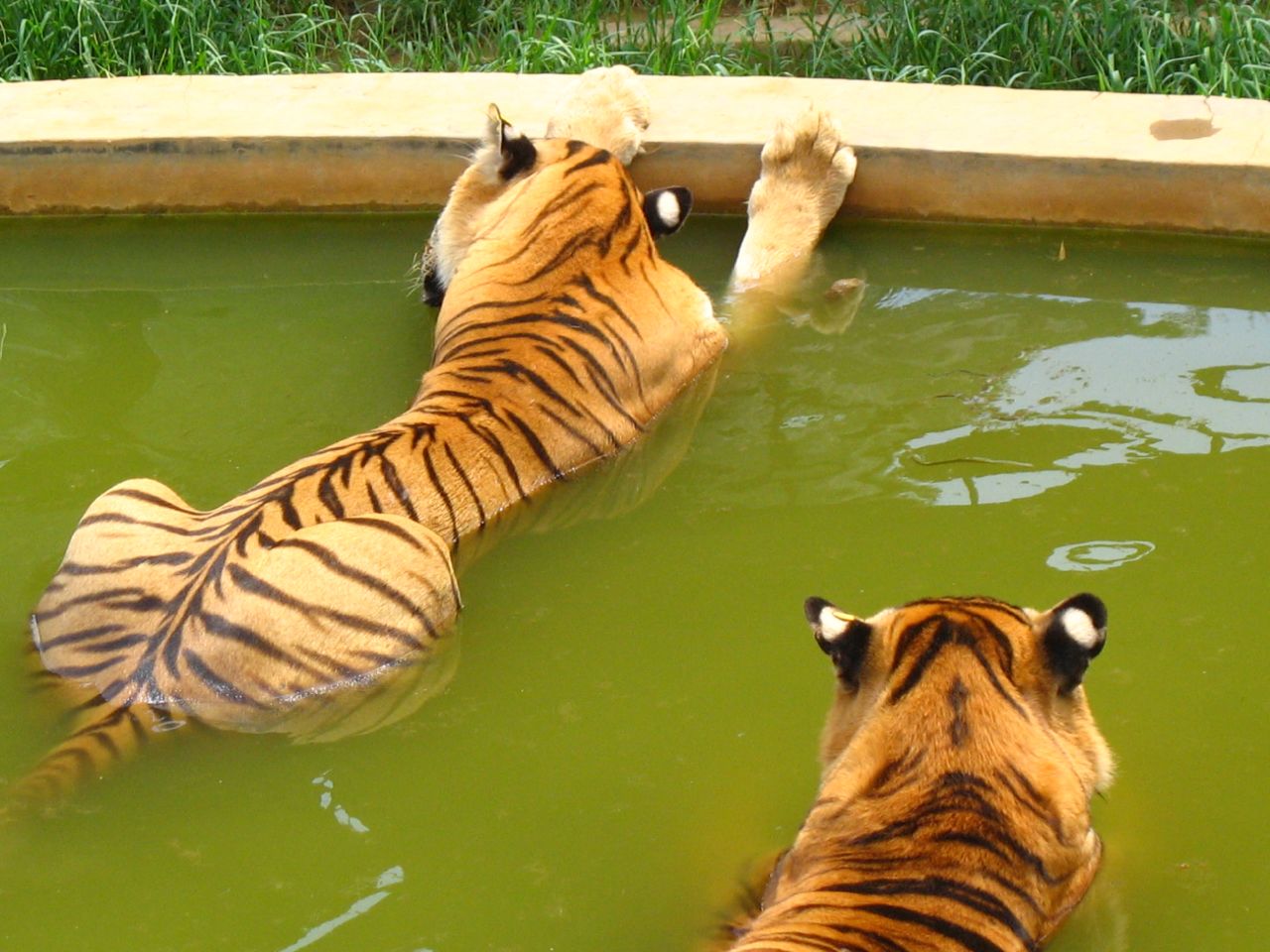
After an expose published by South China Morning Post, the farming and consumption of tiger meat and the use of tiger bones for medicinal products in China have attracted international media attention. And it is probably because of this attention that the restaurant at the park was already closed down by the time we got there. Ok, so no tiger feast. But there's a lot more action in store for us.
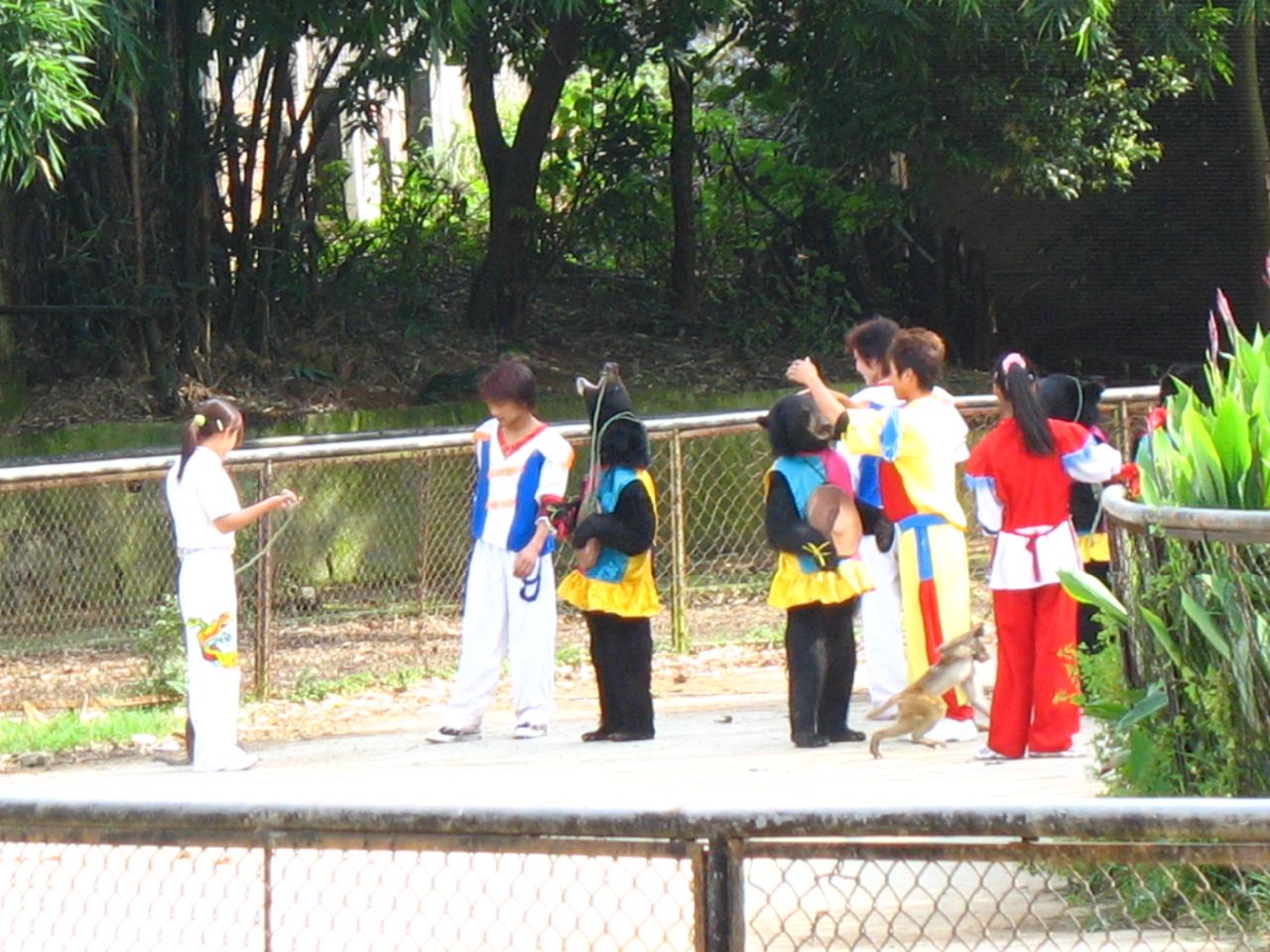
We decided to stay for more entertainment with the bear and tiger performance. Bears were dressed up like dolls, made to walk upright alongside children, and ride a motorcycle on a tightrope. Tigers get to on a parade, jump through hoops, get fed by children and wave to the crowd. A real circus.
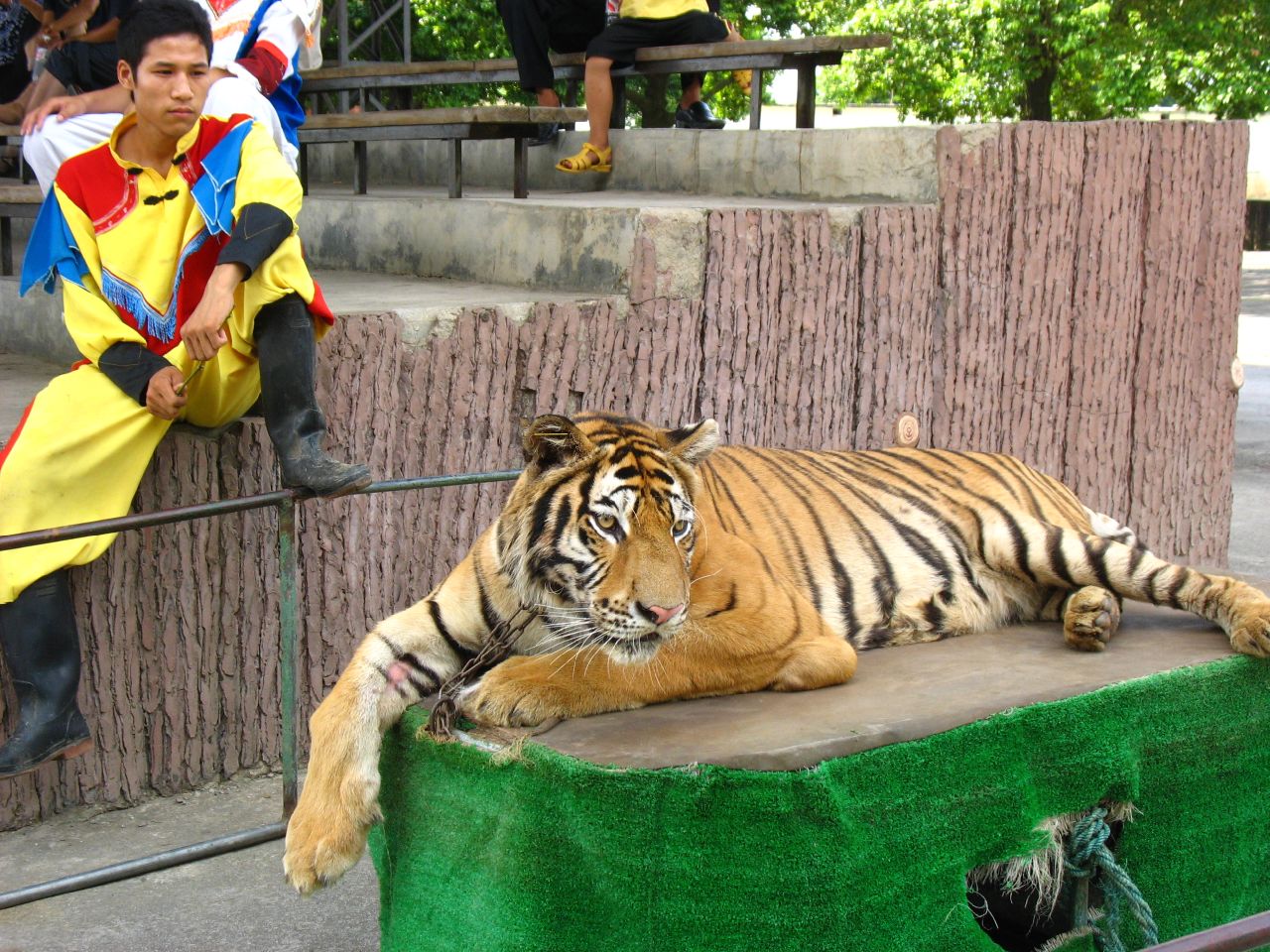 A tiger on display was looking lethargic lying on a tiny platform. Upon yawning, the large cat was given a smack on the face by his trainer. "Pak! Pak! Pak!" I flinched, anticipating the beast to retaliate by biting they guy's face off. But it kept quiet instead.
A tiger on display was looking lethargic lying on a tiny platform. Upon yawning, the large cat was given a smack on the face by his trainer. "Pak! Pak! Pak!" I flinched, anticipating the beast to retaliate by biting they guy's face off. But it kept quiet instead.Hmm, no action there. So we decided to stay for the live feeding. After watching tigers pounce on their prey at the Harbin tiger park, this wildlife training activity no longer seem so shocking anymore. Just that this time, it is one-on-one -- one tiger vs one cow. And the tiger is doing it more for show than for food. Once it killed the cow, the tiger automatically returned to its cage, probably preferring the sliced and canned meat that the zoo prepares rather than such primitive means of killing for food. And humans think they're the only ones who've evolved. Click here to view the live feeding video
More pictures of Guilin here
Staking Out With CNN - Part 3
 This story is part of a documentary for Anderson Cooper 360 to be aired in Oct 2007. The trip to Guangzhou investigates the trade and consumption of wildlife in China. Click on image to view video of a cage of civet cats being filmed by the CNN crew at the 3-1 market, Guangzhou.
This story is part of a documentary for Anderson Cooper 360 to be aired in Oct 2007. The trip to Guangzhou investigates the trade and consumption of wildlife in China. Click on image to view video of a cage of civet cats being filmed by the CNN crew at the 3-1 market, Guangzhou.Day 5
0547 hrs 3-1 Market
 It was like a police operation in the movies. Today, our van was packed. We had our host Dr Gupta and an expert from Traffic East Asia, 2 cameramen, 2 producers and another 3 of us in the crew. The animal traders were already busy unloading their trucks. All we had to do was to jump out of the van and start shooting, with Dr Gupta and his expert talking as they approach the animals. So it was set.
It was like a police operation in the movies. Today, our van was packed. We had our host Dr Gupta and an expert from Traffic East Asia, 2 cameramen, 2 producers and another 3 of us in the crew. The animal traders were already busy unloading their trucks. All we had to do was to jump out of the van and start shooting, with Dr Gupta and his expert talking as they approach the animals. So it was set. The producers were ready. “On the count…1…2…3…go, go, go!”
Someone tried to yank the door open. Silence. We stared at each other for a moment. The doors were locked. “Unlock the door!”
Ah, yes. We had to translate it to the driver.
 So our 2 cameramen jumped out of the van and immediately started filming with their humongous video cameras and spotlights shining. Everyone piled out of the van after that and all hell broke loose.The traders started to keep their cages, buyers sped away on their motorcycles, some people started to run with their animals in hand. “Run, run!” they yelled. One guy spotted the camera and immediately ran off with a civet cat dangling from his hand. Mary Anne chased after one guy with her handycam as
So our 2 cameramen jumped out of the van and immediately started filming with their humongous video cameras and spotlights shining. Everyone piled out of the van after that and all hell broke loose.The traders started to keep their cages, buyers sped away on their motorcycles, some people started to run with their animals in hand. “Run, run!” they yelled. One guy spotted the camera and immediately ran off with a civet cat dangling from his hand. Mary Anne chased after one guy with her handycam as  he tried to hide from the crew. Some bystanders were laughing and were thoroughly amused by the whole commotion.
he tried to hide from the crew. Some bystanders were laughing and were thoroughly amused by the whole commotion.By that time, a crowd was beginning to form around us. As one of the two Chinese-looking person among the foreign crew, I was beginning to feel self-conscious. “If you perceive any threat at all, let us know immediately,” whispered one of our producers. The fact that he said this didn’t make me feel any more relaxed. If the market people start talking to me, I’m just going start speaking in Malay, I told myself. Don’t ask me why I brought these foreigners here. We’re just doing a story. Besides, I’m Malaysian J Yes, just smile.
But well, it all went on smoothly. I didn’t really get harassed, we got our illegal animals on film, we’ve got footage of people running with their animals (that was a good one), and we get to go home tomorrow. “I was expecting a brick to come flying our way. Now, that would be the money shot. But we’ve got our civet cats,” Phil commented.
Dr Sanjay Gupta's account of the visit to the illegal wildlife market in Guangzhou is available on CNN's Anderson Cooper 360 Blog
Staking Out With CNN - Part 2

Day 3
0558 hrs 3-1 Market
Another early stakeout at the 3-1 market. For today’s undercover job, we had requested for a tinted van, just to shoot the market up close as we drive by.
This time round, there were transactions going on outside the gates as trucks pulled up and cages of animals were trawled out. There were cages of hogs, boars, civets and other exotic creatures that were being traded right outside the market.
Phil and I walked over to take a closer look and had a chat with the local traders. People were wary and nobody wanted to talk.
Pointing at a cage of squirrel-like furballs, I asked innocently, “What are these?”
“Animals,” the trader replied casually.
Not immediately discouraged, I pointed to another creature that looked like a porcupine, “What animals are these?”
“These are…sweet potatoes.”
Suspicious of our presence, he questioned us. “Are you reporters? If you are, we’re not going to…” he trailed off as he loaded the cages onto his truck hastily.
“Of course not!” I assured him and continued to look at the other animals that had just arrived. There was a truckload of colourful birds and chickens. When asked what those were, the truck driver just said, “wild chickens”.
After looking at more “sweet potatoes”, we went back into the van and found a strategic parking point to film the activity going on outside the market—cages of animals being loaded onto trucks and money changing hands.
1708 hrs Cong Hua, 2 hours away in the outskirts of
Following the recommendation of our driver, we decided to try our luck at the outlying areas of
The lady invited us inside to take a look at their meat. They had snakes and wild boar. No, snakes won’t do. We want big snakes. And civet cats or pangolins.
“Pfft! What are these here? We don’t want wild boar or wild chickens! We might as well eat in the city if we wanted pork and chicken!” Our driver cursed them for their incompetence. “Come on, fat boy. Show us something more interesting. If we come back later on, can you get us something better?”
The chubby chef and the lady smiled nervously. “What exactly do you want?”
“Civet cats or pangolins.”
“No, no, no. That’s illegal!”
Ok, we decided to move on. The second restaurant was hidden inside an estate off the main road. After doing the whole dancing-round-the-bush talk, we had some result.
“It’s hard to get those wild animals nowadays. The authorities are cracking down hard. You’d have to make reservations. The price of pangolins now is about 1000 yuan for 500g,” said the female owner.
“Tell her that price is not a problem,” Phil waved his finger.
“I’ll see if I can find anything,” she smiled.
She made a phone call and came back with news that someone else might have a pangolin. She would have to confirm that with us again in another hour. So we exchanged phone numbers and told her that we’ll be back later if she can get us the animal.
About twenty minutes later, the lady called. If we really want the pangolin, we’d have to pay first. Then, she’ll go get it from her supplier. This was a tricky situation. There was no way we could buy the pangolin as that would be illegal. Plus, we were not authorized to spend a few thousand yuan on an endangered animal. So we tried to negotiate with her to see if we could have a look at the animal before deciding if we want it. We just needed a shot of the animal, dammit! But given the current situation with the authorities, traders were extremely cautious. If you want something, you’d have to pay for it up front.
Day 4
0645 hrs 3-1 Market
It has become a daily routine to check out the 3-1 market at dawn. We did our usual round, this time only driving past the market 2 times. It was set. We’d just raid the place the next morning with the whole crew and film our stand-up right there.
0334 hrs Hao Xian Lu Market
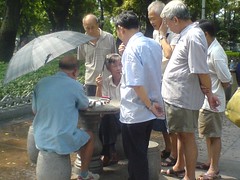
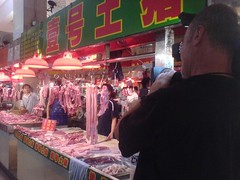
The rest of the day was spent filming around
Compared to
Staking Out With CNN - Part 1

Guangzhou
Day 1
1708 hrs
We landed at the
Right, why didn’t we guess that? We were on an undercover trip anyway. Why would we want the whole world to know CNN is here?
2023 hrs 3-1 Market
Timothy, a representative from the wildlife trade monitoring network in
There were 2 markets next to each other, the Dong Wang seafood market and the 3-1 animal market that sells small mammals. Our aim that night was just to have a look around the area and to get a feel of the atmosphere there. One of our journalists, Tim, had the hidden camera ready for the visit. Timothy and Tim went in first, and I strolled in separately.
The first market, Dong Wang market, sells turtles. Only a few shops were open among the rows and rows of market stalls. Kids were running around after taking a bath in a plastic basin in front of the stalls. It was hard to fit in. Most of the people who go to these markets had to be restaurateurs and chefs in the industry. I had my red-rimmed glasses on, khaki pants and ‘Birkinstick’ sandals while everyone else had their t-shirts rolled up their stomachs, shabby shorts and rubber slippers. Not the kind of outfit I had in mind. I had a glance at some of the shops and moved on over to 3-1.
3-1 gave me the chills. The market was dark, the people looked dodgy and there were sounds of animals wailing. The people were either staring at my fake Birkenstocks or it was just me feeling paranoid from the stares burning into my back. All I could see were shadows of animals in cages—cats, wild boars, ducks and other furry mammals lying around. I didn’t dare walk any further down the aisle for it was only the first day of our trip and I was not ready to be served up on the dinner table just yet. So I walked out of the market and waited outside the gate.
Just as I was about to head back into the van, a man with a square basket stopped by the side of the road. Another man came over with a sack and opened the lid on the basket. From the silhouette, I could see him pick up shrieking little civet cats and threw them into his sack. He pulled 2 out of the basket, dumped them into a sack and shoved them into the helmet box at the back of his motorcycle. He took out another sack, filled another 2 civets in, opened up the motorcycle seat and stuck them inside. With that he took off.
We returned to the hotel after about half an hour at the market. Tim was excited to show the rest of the crew what we saw. “Did you see anything illegal?” our producer asked. “We saw some civets!” he announced. That got everyone excited until the video file was nowhere to be found on the camera. “Umm…did red record icon pop up when you pressed record?” “No…”
Day 2
0500 hrs Dong Wang market
We arrived back at the Dong Wang market at dawn and surveyed the area around it. This time, we sent our photographer Phil and Timothy back in. Phil’s cover—South African white man looking for some exotic bush meat in the land of ‘all-you-can-eat’
Phil’s visit was warmly greeted by the sellers. The showed him the turtles and gave him some tips on how to cook them. Timothy asked if they had big snakes but was told that they were illegal and nobody stocks them now due to the recent police crackdowns.
1032 hrs Qing Ping market
The Qing Ping market had hoards of tourists crawling around its little lanes and pet streets. Perfect for our little ‘tourist handycams’ and cameras. My cover for the day—recent university graduate, foreign language expert and tour guide. Since Timothy and I were the only Chinese among the group, we split into two teams: Phil and I, and Timothy with Tim and Mary Anne.

They have everything here. There was the TCM area that sells all traditional Chinese medicines, and the animal market area with all the legal meat, which ranges from chickens to snakes, turtles, scorpions, cats, and frogs. Turtles are big business. There were shops filled almost to the brim with turtles stacked atop each other. You could hear the clacking sound of claws scraping on the shells. At the same time that we were there, we saw a large truck unloading bags of turtles onto the street. It was literally a mountain of turtles and if any of those bags fell on you, you’d probably be knocked out. Many of the turtle shops are wholesalers who deliver up to 10 tonnes of turtles a day. And it’s all for consumption.
At the scorpion stalls, buyers were perched on little stools picking out juicy scorpions with chopsticks. We say some remnants of what used to be a turtle as the stall lady cleaned up her chopping board. The seafood stalls had buckets of water snakes and eels. Sellers were happy to pick up the snakes and show it to us. At the chicken stalls, there were cats locked up in cages. As we were about to cross the street towards a pet shop, we saw a seller pick up a garlic mesh bag with a cat inside and put it inside a red plastic bag…just like how you would carry a bag of onions or garlic.
Many of the stall owners seemed very interested in my job. “So, you’re just bringing one guy around?” “How much do you earn a day? Must be at least 500RMB a day. That’s a real good deal.” “Come, sit down. So how much are these foreigners paying you? Must be fun, huh, going around everywhere.” I smiled. Apparently there are some ‘personal tour guide’ services that offer more than just a guide because I have a few shop owners asking, “Are these guys malat (sleazy in Cantonese)? Can they hug you or hold you? I’ve seen many of them around with their ‘tour guides’. Well, you be careful, girl. Better stick to the big tour groups. These guys, they eat and they leave.” Thanks for the tip, pal. I couldn’t wait to translate that to Phil.

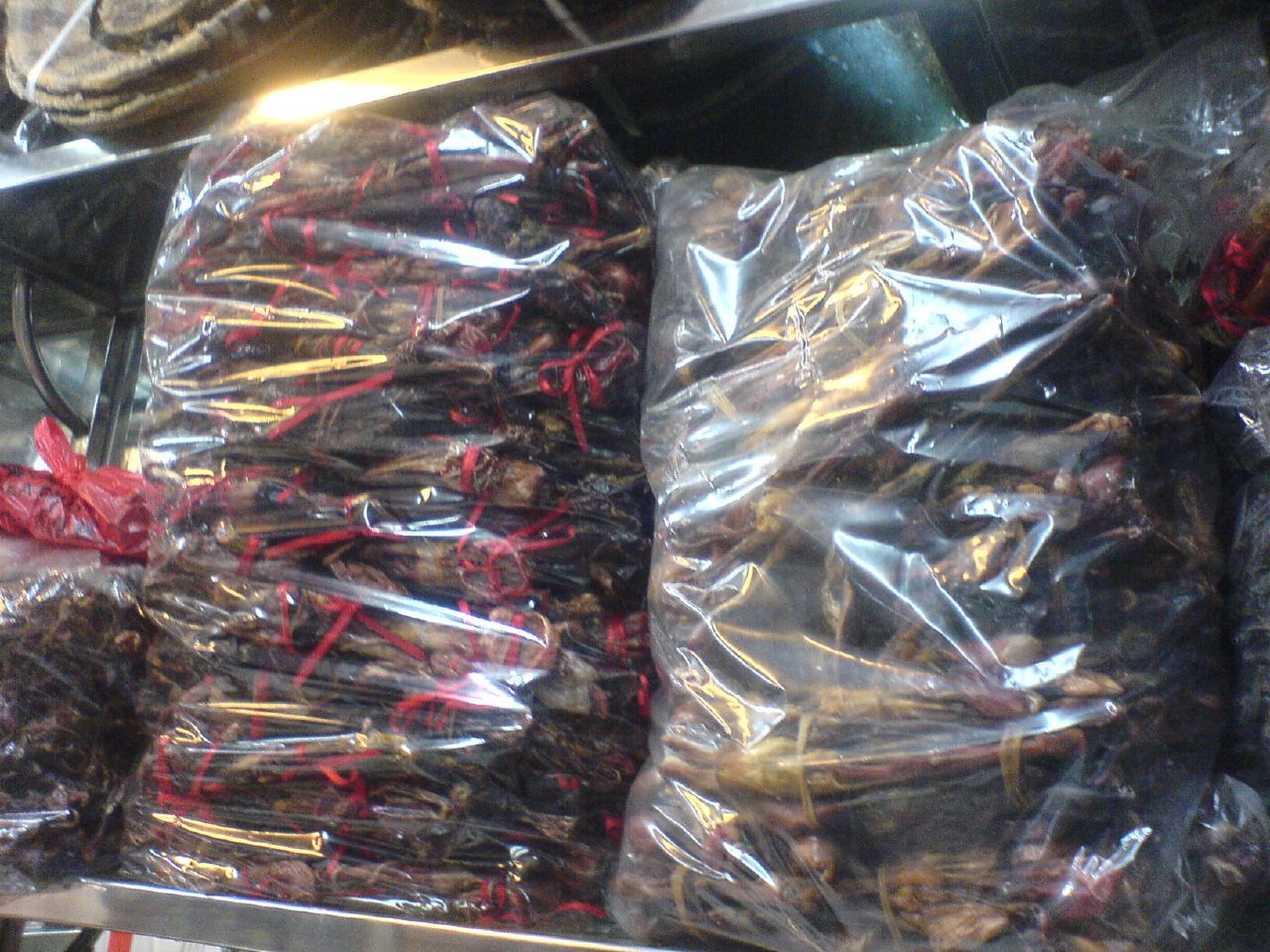
 After an hour or so, we regrouped to swap teams. I checked out the TCM market shops with Mary Anne and Tim, and Timothy was off to hunt for tiger bone wine with Phil. I’ve never seen so much ginseng drying on the side of the road before. Reams and reams of snake skins, deer antelopes, birds’ nests, bottled snake wine, dried centipede, dried geckos on a stick, penises of all animals big and small, from deer to sea lion (never seen so many penises before, bags and bags of them)…it was a dead animal’s circus. Besides animal products, there were also expensive herbs such as cordyceps which could easily cost more than a few thousand RMB for just a few grams.
After an hour or so, we regrouped to swap teams. I checked out the TCM market shops with Mary Anne and Tim, and Timothy was off to hunt for tiger bone wine with Phil. I’ve never seen so much ginseng drying on the side of the road before. Reams and reams of snake skins, deer antelopes, birds’ nests, bottled snake wine, dried centipede, dried geckos on a stick, penises of all animals big and small, from deer to sea lion (never seen so many penises before, bags and bags of them)…it was a dead animal’s circus. Besides animal products, there were also expensive herbs such as cordyceps which could easily cost more than a few thousand RMB for just a few grams.
In our quest for some illegal bear bile products, we were shown something else that kept us excited for the next ten minutes. With her eyes fixed on a blonde Mary Anne and ageing Tim, the lady shopkeeper asked me, “Why don’t you ask them if they need something to zhuang yang (strengthen the ‘yang’ energy, or sex drugs, in short). They usually like those.” With that, she took out a box of assorted medication from under the table and showed it to us. Great, porn medicine. There were boxes with pictures that looked like porn movie covers and also a box of little blue diamond pills labeled as Chinese Viagra. There was also a medicine called “Like a tiger, like a panther”. Rrrrr…
WWF? Isn’t that for wrestlers?
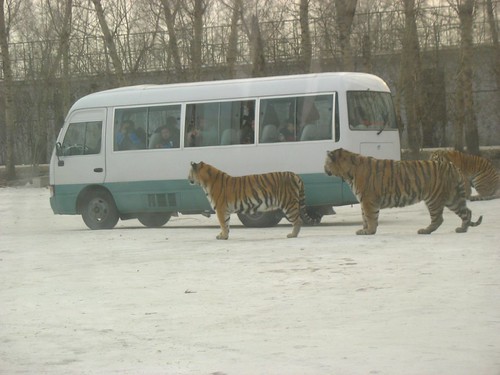
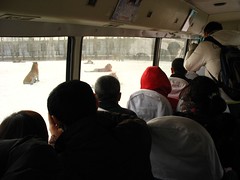
First stop at
A local tourist on our bus ordered a sheep for the spectacle. We waited for 20 minutes before a van pulled up and shoved a frightened little sheep out the door. Everyone rushed to one side of the bus and pressed their cameras against the windows.
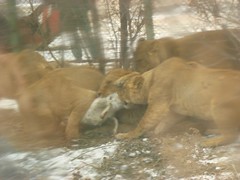
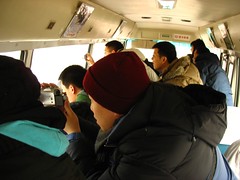
The sheep moved two steps, let out a “baaa” and was immediately pounced by a dozen tigers. That was barely 2 seconds. The crowd went wild as the tigers dragged the sheep away. Video cameras were everywhere. From the distance, I could hear the poor little sheep go “baaaaaa….” before it slowly faded.
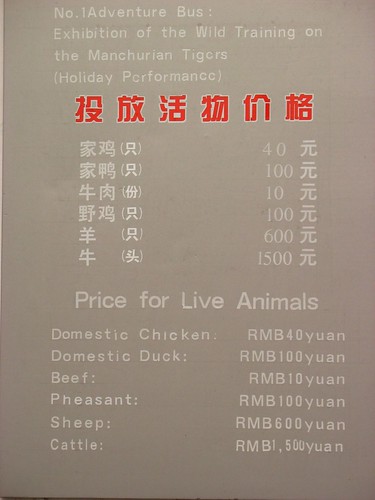
Harbin

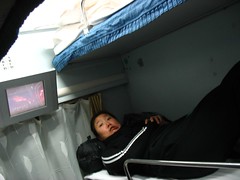
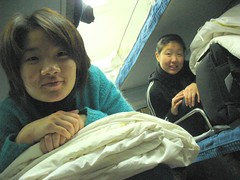
The mad rush for train tickets to
We slept through the 12-hour journey and found ourselves in
4 Jan
2105 hrs: Train departs
5 Jan
0845 hrs: Arrive at
Noon:
Late afternoon:
6 Jan
Morning:
Noon: Snow Sculpture Art Fair
7 Jan
Yabuli Ski Resort
Morning: Snowboarding at Yabuli
Noon: Return to
2030 hrs: Train back to
COST (student price)
BJ-Harbin tickets : 221
Accomodation (2 nights): 128
Harbin-BJ tickets: 368
Ice Festival: 75
Snow Festival: 50
Yabuli package: 580
TOTAL: RMB 1472
400RMB to Switzerland and back - Qingdao gets you there

“Don’t worry! We,
Yes, we’ve all heard about the cheats and conmen and charlatans that they have in
And it all went well. We had a cheap ride to our hostel and
Quote from Lonely Planet
The Food
The beaches in
The Beach


However, one thing that was very obvious at the beaches in
The Beer

Then again, when at
More Qingdao pictures in my Flickr photo journal
Read about the eventful train ride to Qingdao






